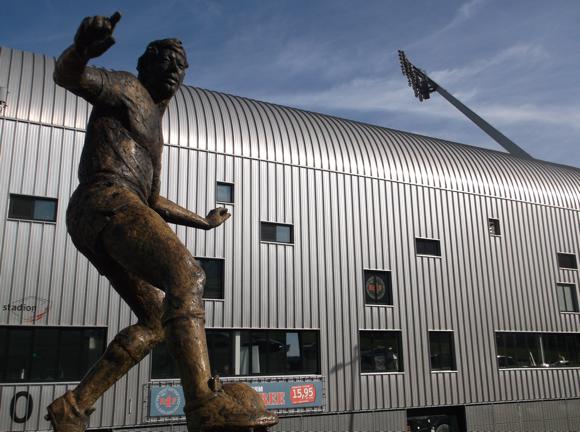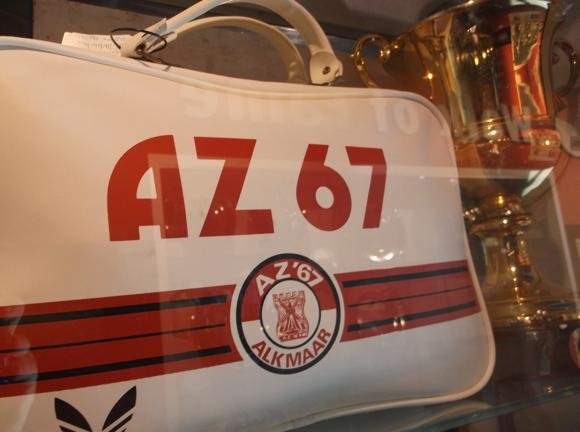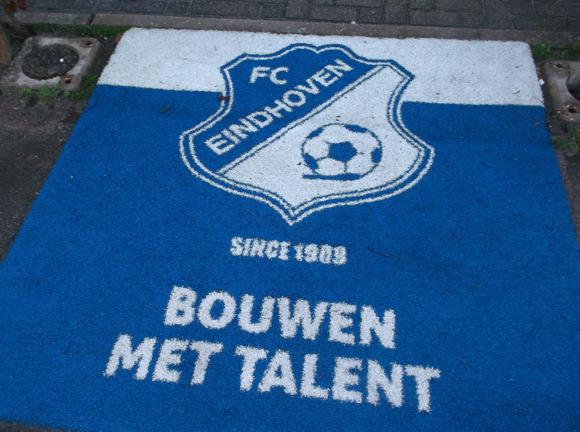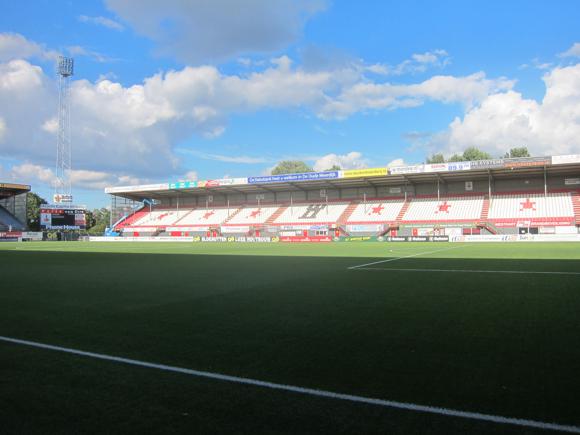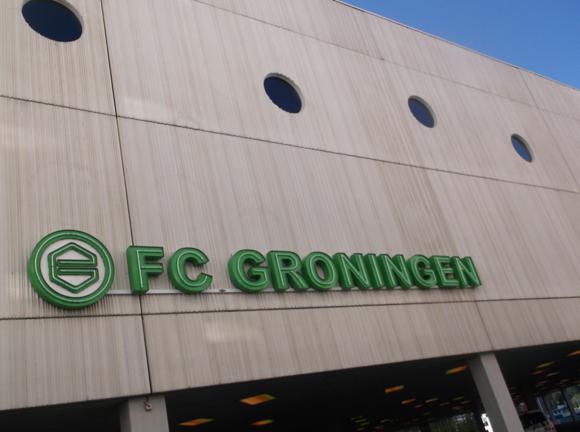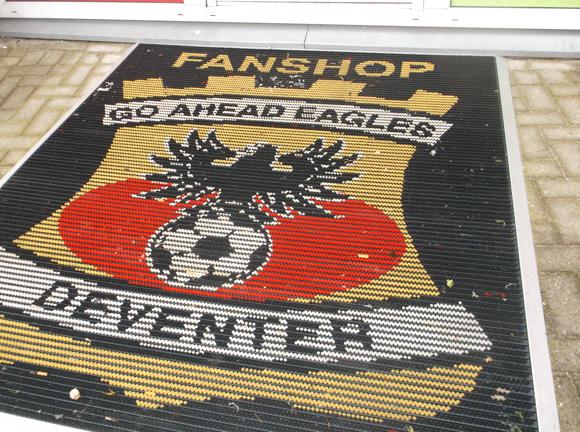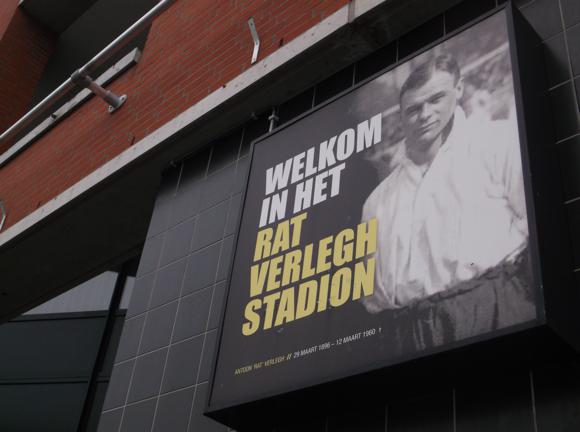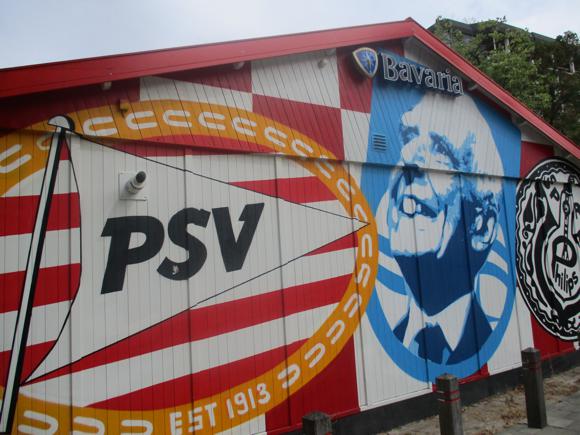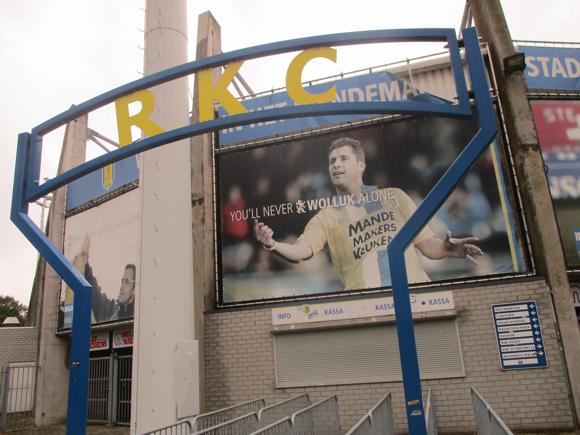A fan’s guide – the club from early doors to today
Record Dutch champions Ajax are a football superpower and four-time winners of Europe’s premier trophy. Every generation brings another thrilling young Ajax side, the latest coming painfully close to a Champions League final in 2019. A stoppage-time goal from Tottenham put paid to an epic run, Ajax seeing off 2017 finalists Real Madrid and Juventus and re-establishing belief in the tournament as a whole.
Europa Cup finalists in 2017 with the youngest team to star at such a showcase, Ajax have always placed belief in nurturing their own talent, the classic example being all-time icon Johan Cruyff. The modern-day stadium that has been the club’s home since 1996 took Cruyff’s name in 2018.
Formed in the Café Oost Indië, Kalverstraat, by local businessmen on March 18, 1900, Ajax notched up pre-war titles under English coach Jack Reynolds. A modest stadium, the De Meer, was built, but the club only took off in the 1960s.
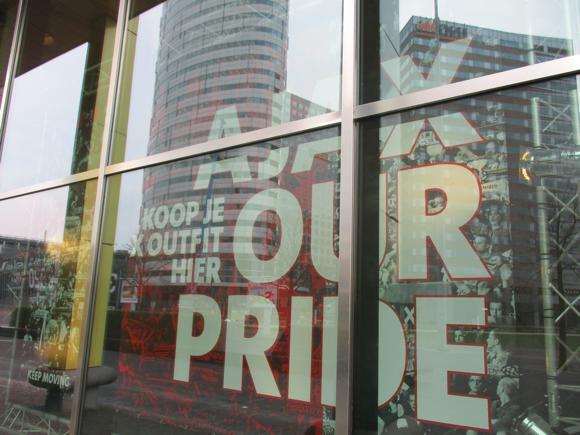
Coached by former Ajax forward Rinus Michels, an adventurous team was based around teenage prodigy Cruyff and swift winger Piet Keizer. Along with three consecutive Dutch titles, Ajax thumped Liverpool 5-1 on a foggy night in 1966.
A European Cup final defeat to AC Milan in 1969 was avenged at Wembley two years later with a 2-0 win over Panathinaikos.
With Romanian coach Ștefan Kovács taking over, and aided by Johan Neeskens, Horst Blankenburg and Ruud Krol, Cruyff shone. Ajax adopted Total Football, a fluid system of interchanging positions, team-mates anticipating runs from deep. The conductor was Cruyff. Ajax dominated the European Cup twice more, before Cruyff and Neeskens headed for Spain.

Ajax’s form dipped until 17-year-old striker Marco van Basten made a dream debut in 1982-83, substituting a veteran Cruyff to notch his first goal. Cruyff then coached van Basten’s Ajax to the European Cup Winners’ Cup in 1987.
Under Total Football follower Louis van Gaal, a buccaneering Ajax took the UEFA Cup in 1992, star striker Dennis Bergkamp later replaced by Finn Jari Litmanen. A new young side nurtured at the Ajax Academy came to the fore. With the return of ’87 veteran Frank Rijkaard, van Gaal’s youngsters swept to Champions League glory in 1995, a 1-0 win over AC Milan courtesy of 19-year-old Patrick Kluivert.
The team soon broke up, Clarence Seedorf and Edgar Davids leaving a year later, when Ajax lost the final to Juventus on penalties. Marc Overmars, the de Boer brothers and goalkeeper Edwin van der Sar also departed.
Under Ronald Koeman, Ajax won the double in 2002, with help from feuding team-mates Rafael van der Vaart and Zlatan Ibrahimović. The further sales of Wesley Sneijder, Ryan Babel and, later, forward Klaas-Jan Huntelaar, attracted criticism, assuaged by the arrival of prolific Uruguayan Luis Suárez.
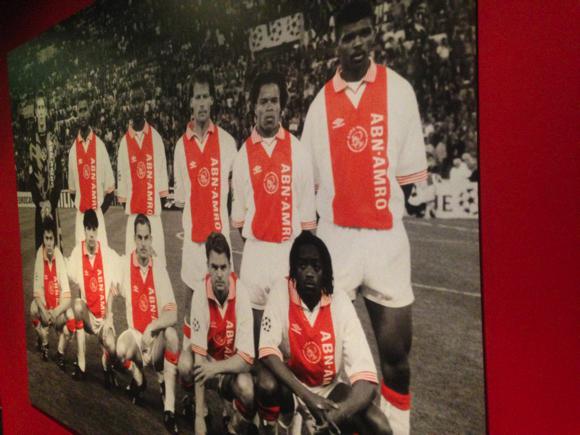
Coach Martin Jol made goal-a-game Suárez captain, his goals helping the club to a first title in seven years before he, too, left.
With old boy Frank de Boer at the helm, Ajax claimed a record four straight titles from 2011 to 2014, the last without wonder boy Christian Eriksen. Without Danny Blind, they failed to make it make it five in 2014-15.
Ajax went into the final games of the campaigns in 2015-16 and 2016-17 with the title in the balance, but it wasn’t to be. Reaching their first European final in two decades, a young Ajax side froze on the night against Manchester United, who had too much savvy and lifted the 2017 Europa League.
Coach Peter Bosz having left for Dortmund, Ajax struggled at home and abroad, the bright spark being the breakthrough of Justin Kluivert, son of Ajax legend Patrick. Manager Erik ten Hag then stepped in, stellar midfielders Dušan Tadić and Donny van de Beek, one ex-Southampton, the other a classic Ajax graduate, helping the Amsterdam side reach the knock-out stage of the Champions League.
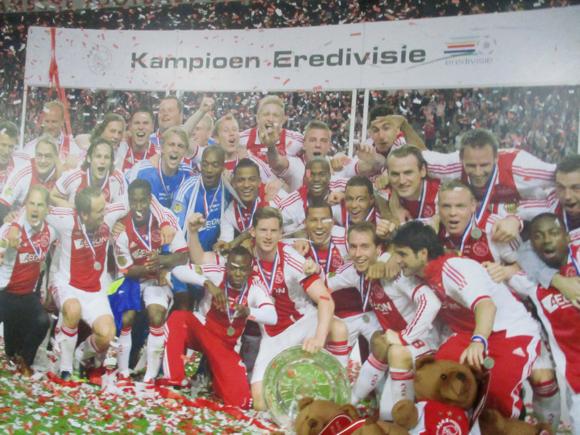
Trailing Real Madrid 2-1 after the home leg, and with Tadić simply imperial, Ajax shocked the Bernabéu with an electric display, coming away with a 4-1 whitewash of the record European champions.
There was more of the same in the quarter-final, Matthijs de Ligt and Frenkie de Jong bursting onto the world stage to help to a devastating 2-1 defeat of Juventus in Turin. De Ligt and de Jong were quickly snapped up by Juventus and Barcelona respectively, lending a poignant touch to the semi-final clash with Tottenham. Winning 1-0 in London and going into half-time in Amsterdam 2-0, Ajax were stunned by a Lucas Moura hat-trick, the killer deciding away goal coming in the 96th minute.
The team signed off with a 34th domestic title for Ajax. Veteran Klaas-Jan Huntelaar kept scoring as Ajax maintained domestic superiority in 2019-20, with Tadić notching vital goals to steer the club to another Champions League group stage.
Having sold Hakim Ziyech, van de Beek and Sergiño Dest for a combined €100 million, Ajax splashed out on prolific striker Sébastien Haller halfway through the double-winning season of 2020-21. The Franco-Ivorian came into his own the following campaign, hitting a phenomenal 34 goals in all competitions, 11 in the Champions League alone.

What should have been a high-scoring run to the later stages of the competition ended in frustration in the first knock-out round when Benfica kept Ajax at bay for 77 minutes before scoring with their only chance of the game, a poorly defended free-kick. Haller duly left for Dortmund, ten Haag, Old Trafford.
Flush from a successful half-year at Bruges, Alfred Schreuder used revenue from the sales of Haller and Argentine centre-back Lisandro Martínez, who followed ten Haag to Manchester, to invest in former PSV star Steven Bergwijn. The young striker soon justified his Dutch record fee with a goal in a 4-0 drubbing of Rangers in the Champions League.
A run of six draws either side of Christmas scuppered any chance of a title defence but behind the scenes, the club was in trouble. Star of the van Gaal era, director of football at Ajax since 2012, Marc Overmars had overseen a savvy transfer policy, keeping the club in contention at home and abroad. Inappropriate behaviour with female staff led to his departure in early 2022, leaving the club rudderless.
Failing to qualify for the Champions League and losing the cup final on penalties to PSV pale in comparison to the sheer disaster of the subsequent 2023-24 campaign, underscored by a scandalous 4-0 defeat at home to Feyenoord. Abandoned after constant crowd trouble, the match preceded a further three straight league defeats as Ajax prepared for the unprecedented prospect of a relegation battle.





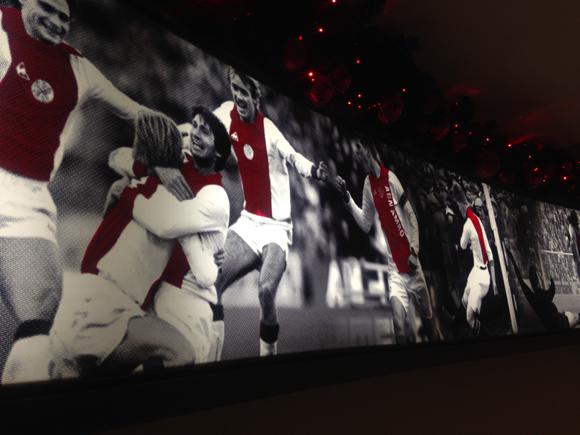

Stadium Guide
The field of dreams – and the story behind it

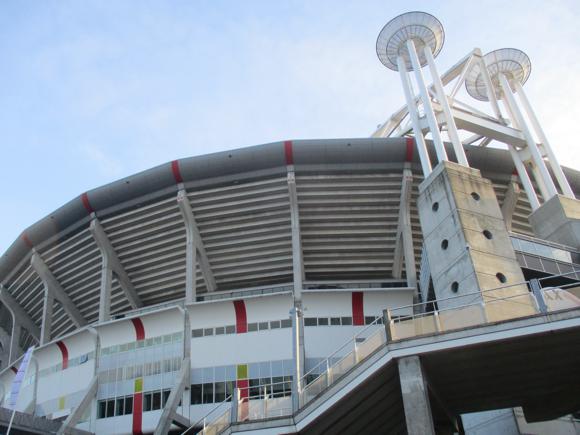


Built at a cost of €140 million and opened in 1996, the 52,000-capacity Johan Cruijff ArenA hosted the Europa League Final between Chelsea and Benfica in 2013. A venue for Euro 2000 and 2020, it stands surrounded by a multiplex cinema, a music venue and countless stores in the once neglected district of Bijlmer south-east of the city. Although criticised for the state of its turf – a sliding roof is a curse and a blessing – the ArenA does show just how far this once neighbourhood club have come in a relatively short time.
In 2018, the stadium officially switched from its original name of the Amsterdam ArenA to honour all-time club hero Johan Cruyff.

Two tiers of brightly coloured seats are accessed by 11 gates, the upper tier containing sectors 401-430, the lower tier 101-129. The home Zuid end (gates G-J, M) houses the notorious F-Side hard-core following of yesteryear. At the opposing Noord end (A-C, K), away fans are allocated sectors 416 and 417 through gate K in the north-west corner.
Ajax tours and the Fanshop are found at the main entrance, Hoofdingang (gates D-F). All payments are by debit or credit card only.
getting here
Going to the stadium – tips and timings
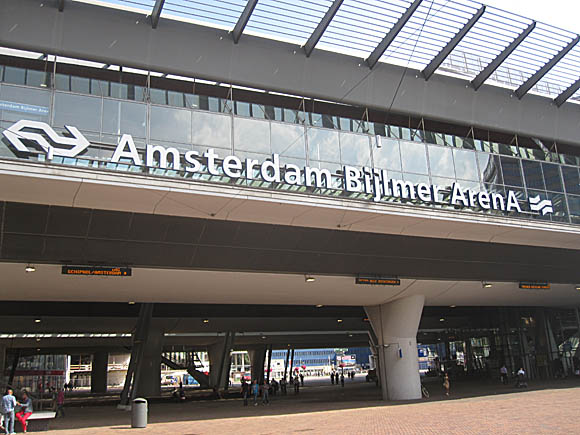
Metro line 54 runs to Station Biljmer ArenA from Centraal, direction Gein. Allow 15 mins. The previous stop of Strandvliet is also reasonably close and more convenient for the Noord end.
The station is on a direct train line from Schiphol Airport, journey time less than 15 mins. From Bijlmer, the ArenA is ahead as you turn left down the stairs from the platform.
getting in
Buying tickets – when, where, how and how much
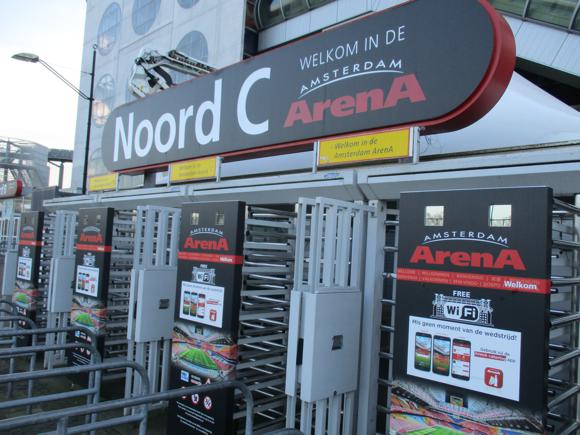
Tickets are only available from the Ajax website – and, even then, availability is usually limited to lesser-attractive league fixtures. Those holding a Club Card (€6/season) have a much wider range of fixtures to choose from but membership is limited to residents of the Netherlands.
For visits of lesser clubs, you pay €26 for a seat behind the goals, €31-€36 (€22 for over-65s) around the corner flags, and €52 for a place over the halfway line. Note that online sales are Dutch-only but relatively easy to negotiate.
For all queries, you can try tweeting Ajax Fancare – the helpline (0900 232 2529) is inland only.
what to buy
Shirts, kits, merchandise and gifts

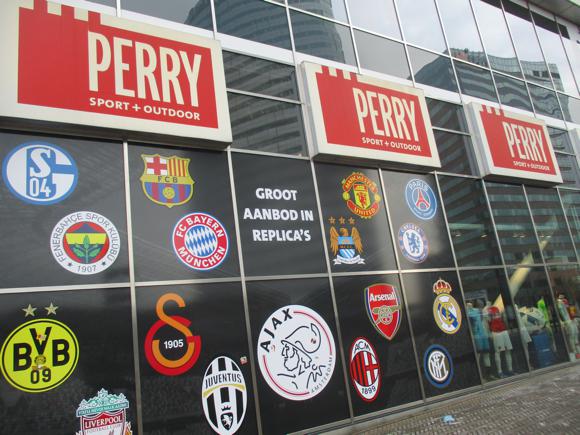
On the west side of the main entrance of the ArenA, the Ajax Fanshop (Sept-Apr Mon-Sat 9.30am-5pm, last Sun/mth noon-5pm; May Aug Mon-Fri 9.30am-6pm, Sat 9.30am-5pm, Sun noon-5pm, match days 10am-30min before kick-off, then for 30mins after final whistle) offers the full range of branded merchandise, including Ajax washbags, money-box clogs and, as we’re in Amsterdam, logo’d bikes for men or women.
Current home shirts in the classic white/red combination carry red adidas stripes over the shoulders, away tops are dark blue with multi-coloured patterned collars and cuffs, and those red adidas stripes.
Nearby Perry Sport (Mon-Fri 10am-9pm, Sat 10am-7pm, Sun noon-6pm) stocks shirts for most top European clubs, Ajax included.
Stadium tours
Explore the ground inside and out

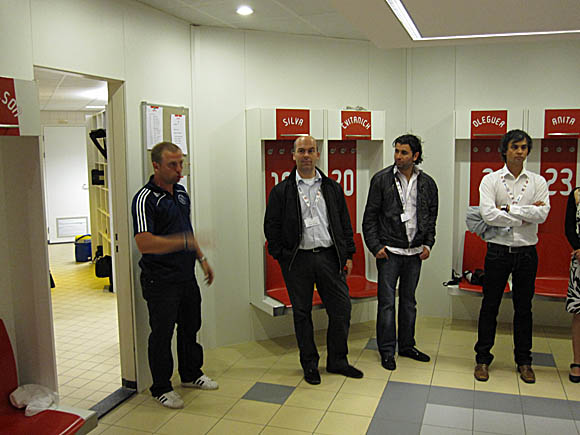
Where to Drink
Pre-match beers for fans and casual visitors
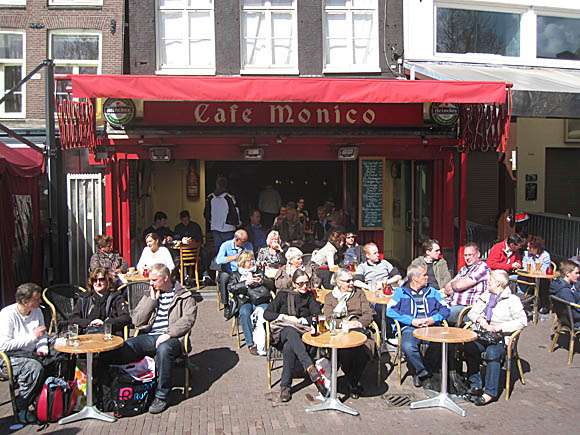


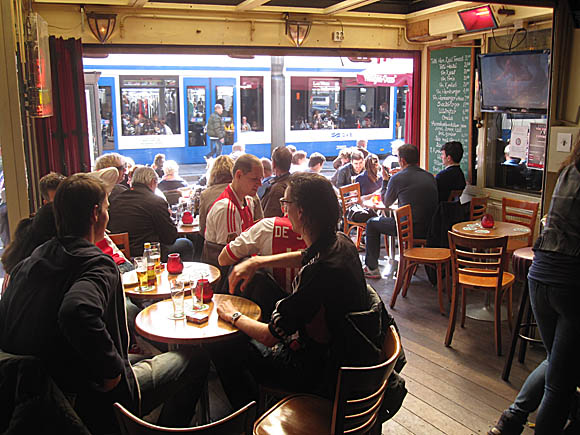



Many gather in town at the Café Monico on Rembrandtplein and/or Café Hesp near Amstel station on Weesperzijde before heading to the ArenA.
The former Soccer World by the main entrance has been replaced by a branch of popular fast-food chain FEBO. Its name recognised by all locals, FEBO here comprises a convivial bar with a terrace, with two TV screens inside and live music laid on before and after matches. Three types of draught Grolsch are usually offered, including the rarer Weizen wheat variety.
Nearby is a popular nameless bar by gate Zuid G – look out for the Grolsch and Guinness signs – amid any number of bland outlets. Grolsch is also the attraction at the otherwise mainstream, restaurant-like Grand Café 3 & 20 on De Passage.


